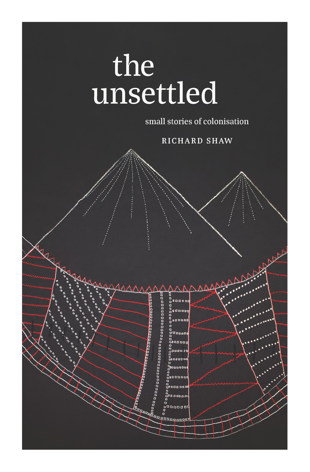Sally Blundell reviews The Unsettled: Small stories of colonisation by Richard Shaw for Newsroom:
‘In Louise Erdrich’s latest book The Sentence, Flora’s proud conviction that she is descended from a Native American is shattered when she discovers her ancestral namesake was not a member of the Métis Nation but a white woman who exploited indigenous women. Flora is devastated. She dies. She comes back to haunt the local bookstore, all rustling skirts and vicious intent. After all, what do you do with such information?
This was the question posed by Richard Shaw in his 2021 memoir The Forgotten Coast. In this book Shaw, a professor of politics at Massey University, explored the lives of three men in his family: his father Bob; his great-uncle Dick; and his great-grandfather Andrew Gilhooly, the son of a tenant farmer from Limerick, Ireland. It is Gilhooly’s story that tugs at his sleeve. Gilhooly was 19 when he arrived in New Zealand in 1874, just 24 when he joined the New Zealand Armed Constabulary (AC) in Taranaki.
By this time the community of Parihaka, led by Te Whiti o Rongomai and Tohu Kākahi, was waging a campaign of non-violent resistance against the surveying of what was meant to be Māori land. Tensions were growing. Fencers and ploughmen were being arrested. Gilhooly found himself part of the workforce building South Road, a military road to provide access to Parihaka. On 5 November 1881, hewas part of the 1500-strong force that stormed Parihaka, evicting hundreds of unarmed residents and, as Shaw writes, tearing the place down. The intention, he says, was not about the appropriation of land – the land had already been confiscated. Rather it was to bring an end to protests and “to bludgeon Māori into submission”.
In 1895, Shaw’s great-grandfather bought his first farm on confiscated land made available for settlement on the seaward side of the new South Road (had this road been built further to the west, as planned, this land would not have been available); in 1902 he took out a lease on land on the mountain side of the South Road, land initially set aside for hapū but administered by the government-appointed Public Trustee in a system that privileged Pākehā farmers over Māori landowners. A couple of decades later his wife Kate purchased a neighbouring farm.
What do I do, he asks, with the knowledge that my mother’s family established itself on land the colonial state had taken from others? And how is it that such details did not feature in family lore?
It was time, he concluded, to “end the forgetting”.’
Read the full review here.


